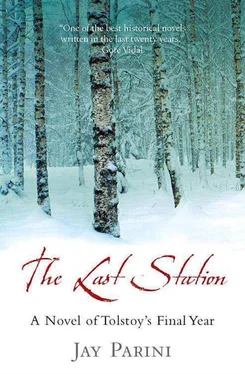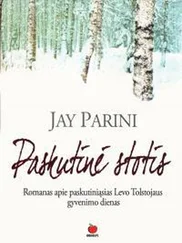I sat beside her with Papa, who smoldered still and volunteered nothing – not a word, not even a sigh. When Mama recovered consciousness, she seemed eerily calm, as radiant as a queen. She asked Papa to promise not to have himself photographed by Chertkov anymore.
‘You’re like an old coquet,’ she said. ‘It upsets the whole family, the way his pictures of you adorn every mediocre paper in Russia. You should have more pride!’
Papa, rather sheepishly, obliged her, saying he would no longer allow Chertkov to photograph him. This appeared to satisfy her, but Papa quickly made matters worse by saying that he did, however, reserve the right to address Chertkov by letter as often as he pleased.
This little maneuver pitched Mama into a turmoil. ‘Look at the way he insists on having the last twist to every argument!’ she said. ‘It’s diabolical!’
The next day she seized me, saying she hadn’t slept all night. ‘All I can think of,’ she said, quite breathless, her cheeks bright with fury, ‘is that, from now on, his letters will be full of unfair remarks about me, schemes and frightful lies – all written under the guise of Christian humility. Your father thinks he is Christ, Sasha. That’s a sin, you know. A soul can be condemned to hell for that.’
‘On the contrary,’ I said, ‘Papa is extremely humble.’
‘He’s an egomaniac! He thinks he’s Christ, and he lets Chertkov play the role of chief disciple. It would be comical if it weren’t sick.’
Mama lay in bed at Kochety for days, feeding on sweets, drinking tea and chocolate, hunting through her husband’s early novels and stories for signs of perversion. In Childhood she found a description of a man called Sergey. She called Papa into her room and read the passage aloud to him in her ludicrous, stentorian way.
‘How is it that he prefers Chertkov, that obese, balding idiot, to me?’ Mama asked one morning as we sipped tea in her dressing room.
‘He still loves you, Mama. Why else would he stay?’
She ignored the implications of my question. ‘I remember when I would be naked, standing by the Voronka, ready to bathe,’ she said. ‘And he would surprise me, overtake me. He would roll me into a high patch of weeds, where he would ravish me.’ Her eyes rolled as she spoke. She appeared quite mad, like Othello just before he murdered Desdemona, his big, white eyes burning in a dark, twisted face.
I did not enjoy hearing this. This was not the sort of thing one said to a daughter.
I could not have made it through these tense days at Kochety without Varvara, who never allowed the atmosphere of deceit and madness to bother her. She is like a running brook beside my field, watering my roots. Without her, I would shrivel.
Papa questioned me about Varvara in a most peculiar fashion one day when I was about to take his dictation. He asked me if I thought I loved her.
‘Yes, I am fond of her,’ I said.
‘But do you love her?’
‘I love her.’
He seemed happy to hear this. I am sure he does not think our friendship is ungodly. He is not perverted, as Mama claims; indeed, he realizes that loving men is the same as loving women in all ways but the most technical.
Mama’s birthday occurred on the twenty-second of the month. She was sixty-six and looked every minute of it. Papa’s birthday came six days later, his eighty-second. It should have been a time of great celebrating, but Mama insisted on rehearsing the old, troublesome issues. One by one, they hammered through them, with Tanya acting as referee.
Papa – who had been battered for days – began this particular round of accusations. We were gathered around the big table at Kochety, when Papa suddenly took it upon himself to say that celibacy and chastity were the two main goals of the Christian life.
‘Listen to him!’ Mama shrieked. ‘Leo Nikolayevich, you are eighty-two years old today and still a fool.’
Tanya said, ‘This is no way to speak to each other on a happy day. Let’s rejoice as a family and love one another, as the Gospels tell us.’ She offered everyone a second helping of venison, while Sukhotin passed around a white wine from the Moselle.
But Mama would not be silenced.
‘A man who fathers thirteen children insults us when he proclaims the holiness of celibacy. Especially if that man has lain beside God knows how many women – or men. It is disgraceful, Leo Nikolayevich. You shame yourself when you talk like this.’
After dinner, I removed Papa from her company. He gripped my arm tightly as we made our way into the long evening shadows, taking a short walk in the park. It was lovely, with barn swallows skimming the trees. The moon pressed its bootheel into the sky’s dark sand while, in the distance, a flock of geese could be heard honking as they flew southward.
‘They know exactly the way to go,’ Papa said. ‘And they don’t have to think about it. How I envy them.’
We stopped by a little pond full of ducks to sit on a stone bench overlooking the water.
‘The pity is,’ I said, ‘that Mama loves you.’
‘What your mother feels for me is not love,’ he said. ‘It has the possessiveness of love, but it’s something closer to hatred. She wants to destroy me.’
This could not be so. Much as I dislike her, I do not think Mama wants to destroy her husband, whom she worships in her twisted way.
‘Perhaps not. But her love is being transformed into hatred, day by day.’ He paused to think. ‘You see, she was saved for many years from her own egotism by the children. The children absorbed her. But that’s over, and nothing can save her now.’
Mama refused to stay at Kochety any longer, since everyone (so she claimed) treated her ‘like a Xanthippe.’ She continued to view her life as a drama – a tragedy – with herself on center stage. ‘She doesn’t want a family,’ Varvara told me. ‘She wants a Greek chorus.’
At Papa’s insistence, Varvara and I agreed to take Mama back to Yasnaya Polyana. He refused to go himself, thank God. He was enjoying himself at Kochety, playing chess with Sukhotin, walking in the park, reading Rousseau every morning and Pascal at night. He dictated letters and revised proofs sent to him by Chertkov. A brief while apart from Mama would be good for him.
I assumed the separation would benefit Mama, too, but as soon as we got home she became highly agitated. The day after we arrived, she walked into Papa’s study in a wild state. Realizing that a number of new photographs by Chertkov and me had been hung on the wall, she dashed them to the floor. Having replaced these by pictures of her own, she sent for a priest, who arrived with his liturgical paraphernalia to exorcise Chertkov’s diabolical presence from the room.
We sat in the hall, listening in near disbelief. Then Mama poked her head out, her eyes black as dirt. ‘I don’t care what your father does, Sasha. He can make everything over to Chertkov, if that’s what he wants. It won’t matter, because I shall break the will. Your brothers will stand behind me, and so will the tsar!’ She throbbed like a chicken’s disembodied heart.
Varvara assured Mama that Chertkov had no such evil plans.
‘The man will stop at nothing,’ Mama replied. ‘He wants to destroy me!’ She decided to return to Kochety at once.
The next few days were dreadful. Back at Kochety, Mama refused to eat any solid food. She would sit at meals, sulking, while Papa hovered meekly, imploring her to nibble. ‘Just a piece of black bread, my love,’ he would say. It was so pathetic that Sukhotin, who is normally pacific, lost his temper. Livid, he rose, leaning on clenched fists at the head of the table. ‘For God’s sake, Sofya Andreyevna!’ he said. ‘Do you know what you’re doing? Your only claim in life is as Leo Tolstoy’s wife, don’t you know that? If he leaves you, history will say it was your fault. And, I swear to you, they will be right!’
Читать дальше












